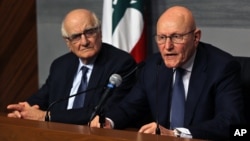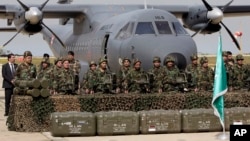Saudi Arabia’s decision to drop a multibillion-dollar arms deal with Lebanon is likely to play into the hands of Iran and Hezbollah, analysts warn.
A charm offensive was launched by sections of the Lebanese government this week amid the fallout from the decision to halt $4 billion in financial grants to the country’s army and security forces.
Lebanese politician Saad Hariri urged Saudi King Salman "not to abandon Lebanon", while Prime Minister Tammam Salam is set to visit Gulf countries in a belated effort to repair the damage.
But amid the scrambling, many have been left scratching their heads over a move that may harm efforts to contain overspill from the Syrian war and could well hand further momentum to Iran in the escalating battle for influence over the region.
Not in harmony
Announced Friday, the cut halted a $3 billion program for the Lebanese army to buy military equipment from France, and a separate $1 billion package for Lebanon’s security forces, though some of this money has already been spent.
Lebanon’s failure to back recent pan-Arab statements condemning support for terrorism by Iran and a recent ramping up of anti-Saudi rhetoric coming from Iran-backed Lebanese militia group Hezbollah are being seen as short-term causes.
Saudi Arabia’s troubling economic situation, fueled by plunging oil prices, may have also been a factor claimed Bilal Saab, an analyst for the Atlantic Council.
“But the main trigger,” he claimed, “is this feeling in Riyadh, this realization that with all the investments made in Lebanon there is little to show for it.”
Losing battle
Saudi Arabia, which is largely Sunni, and Iran, mainly Shia, competed for influence in Lebanon long before the Syrian war ratcheted up tensions. Money has been pumped by Saudi Arabia into the largely-Sunni Lebanese Future Movement group.
Iran, meanwhile, has funded the largely Shia Hezbollah group, which has played a crucial military role in supporting Iranian ally and Syrian leader Bashar al-Assad.
The wording of the Lebanese Cabinet response to Saudi Arabia reflects the delicate balance of power and is mainly “cosmetic,” claims Sami Baroudi.
“No one group dominates in Lebanon,” said Baroudi, a professor of political science at the Lebanese American University. “But for the last few months, with developments in Syria, and the Russian offensive, the tide is shifting towards Hezbollah.”
This growth of clout for Hezbollah reflects a broader expansion in the region for Iran, which has stung Saudi Arabia. There are signs Saudi Arabia is not yet done. Tuesday, it issued a warning to its citizens travelling to Lebanon.
Counterproductive
Analysts who spoke to VOA thought taking revenge on Lebanon would backfire. Unlike other institutions within the country, the popularity of the Lebanese Armed Forces has long crossed sectarian divides, with relatively strong support among Lebanon’s Sunni community, an important demographic to Saudi Arabia.
The army and security forces are battling efforts by Islamist groups like the so-called Islamic State militant group to sow discord through a campaign of bombing, the most recent of which killed more than 40 people in Lebanon’s southern suburbs in November.
Claims from Saudi figures that the decision to cut the aid was “something beneficial” that would help release Lebanon from Iranian control were “pure rubbish” said Saab. “To hurt the only non-sectarian institution in Lebanon which is working to preserve the stability of Lebanon is counterproductive,” he added.
It was a view echoed by Aram Nerguizian, an expert on Lebanon’s defense capabilities and senior fellow at the Center for Strategic and International Studies, who nonetheless cautioned the decision may not be final.
According to Nerguizian, moves to undermine an institution that has been backed by the United States, a key ally of Saudi Arabia, has left a lot of Beirut-based diplomats “dumbstruck”.
The army has found itself “the collateral in a much bigger set of decisions” made by Saudi Arabia as it tried to shape events in the wider region, he said. But he warned the move was a misstep that "plays to Hezbollah interests,” because the army’s weakness was a continued justification for the military power of Hezbollah, and thus Iran.
Left to defend itself
Meanwhile, as Middle East watchers try to understand the move and its motivations, Lebanon will have to continue to try to cope with the impact of the Syrian war with or without Saudi backing. And with well over one million refugees in the country, resources are stretched.
For Hisham Jaber, a retired Lebanese Major General and analyst, it is one more hurdle for a country whose capabilities are being severely tested.
“The country is facing terrorism in the form of Nusra Front (an al-Qaida affiliate fighting in Syria) and ISIS. Their numbers are increasing and they present a real danger to Lebanon. Lebanon is in a critical situation already,” he added, “it doesn’t need this problem.”





